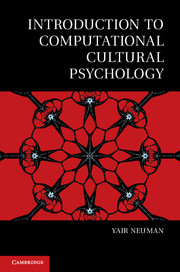Book contents
- Frontmatter
- Dedication
- Contents
- List of Figures
- List of Tables
- Preface
- Acknowledgments
- 1 What is computational cultural psychology?
- 2 The digital psychologist: information technology and cultural psychology
- 3 Why don’t primates have God? Language and the abstraction of thought
- 4 Lost in translation: how to use automatic translation machines for understanding “otherness”
- 5 Spies and metaphors: automatic identification of metaphors for strategic intelligence
- 6 Scent of a woman: the mediation of smell and automatic analysis of extended senses
- 7 Dolly Parton’s love lexicon: detection of motifs in cultural texts
- 8 The relational matrix of the I
- 9 Identifying themes: from the Wingfield family to Harry and Sally
- 10 Eating and dining: studying the dynamics of dinner
- 11 Getting even: the cultural psychology of revenge and what computers can do about it
- Epilogue: on generals and mail coach drivers
- Bibliography
- Author index
- Subject index
3 - Why don’t primates have God? Language and the abstraction of thought
Published online by Cambridge University Press: 05 June 2014
- Frontmatter
- Dedication
- Contents
- List of Figures
- List of Tables
- Preface
- Acknowledgments
- 1 What is computational cultural psychology?
- 2 The digital psychologist: information technology and cultural psychology
- 3 Why don’t primates have God? Language and the abstraction of thought
- 4 Lost in translation: how to use automatic translation machines for understanding “otherness”
- 5 Spies and metaphors: automatic identification of metaphors for strategic intelligence
- 6 Scent of a woman: the mediation of smell and automatic analysis of extended senses
- 7 Dolly Parton’s love lexicon: detection of motifs in cultural texts
- 8 The relational matrix of the I
- 9 Identifying themes: from the Wingfield family to Harry and Sally
- 10 Eating and dining: studying the dynamics of dinner
- 11 Getting even: the cultural psychology of revenge and what computers can do about it
- Epilogue: on generals and mail coach drivers
- Bibliography
- Author index
- Subject index
Summary
“Eat your lasagna!”
In 2010 I was invited to participate in a joint seminar for Israeli and American researchers. During the opening dinner, as the only social scientist in the group, I was seated near an old professor of linguistics from the hosting university, who was almost immediately proud to introduce herself as one of Chomsky’s students.
After positioning herself as a direct descendant of the guru, she asked about my field of expertise. I humorously apologized for not having one but expressed my long-lasting interest in issues of language and thought. “Of course,” she said. “Sapir–Whorf hypothesis regarding the influence of language on thought.” I explained that neither Sapir not Whorf ever presented such a “hypothesis” and never ever presented any simple causal link between “language” and “thought.” “It doesn’t matter,” she said. “This hypothesis has been experimentally refuted.” I tried to explain that the “hypothesis” is really a theoretical assumption and to support my argument made the mistake of bringing to my help several (dead) soviet colleagues such as Lev Vygotsky and Valentine Volosinov.
- Type
- Chapter
- Information
- Introduction to Computational Cultural Psychology , pp. 25 - 56Publisher: Cambridge University PressPrint publication year: 2014



